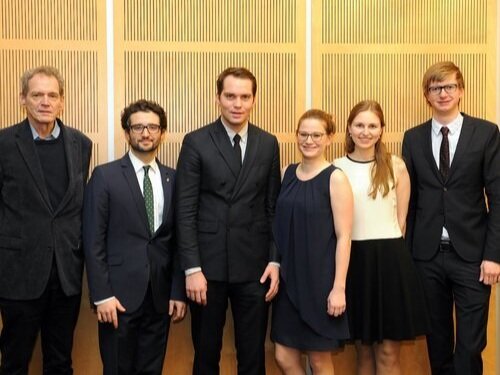Obermayer German Jewish History Award (Anniversary)
Soccer fans use club history to explore anti-discrimination topics
A groundbreaking fan project working with the Hertha Berlin Soccer Club examines prejudice and anti-Semitism
In a green corner of former East Berlin, steps away from the bustle of Schoenhauserallee, is a single story structure with a hand-painted facade. To its west is the Friedrich Ludwig Jahn Stadium, whose giant spotlights light up the night sky.
Inside this unassuming building, remarkable work is done.
Since 1990, Fan Project of Sports Youth Berlin (Fanprojekt der Sportjugend Berlin) has worked with Berlin’s major professional soccer club, Hertha Berlin Sports Club, to promote tolerant and nonviolent soccer culture. Now, one joint venture between Fan Project Berlin and Hertha BSC has fans facing an uncomfortable side of team sports: the past and present of prejudice and anti-Semitism.
Learning from Our History (Aus der eigenen Geschichte lernen), launched in 2015, aims to help change soccer culture and to provide a positive impulse for society by examining club history during the Nazi period, says project director and historian Söhnke Vosgerau, 37, who joined Fanprojekt as a student and freelancer in 2009 and became a member of the staff in 2016.
The project has three major aims: to research the history and role of Hertha BSC under Nazi rule; explore the biographies and fates of long-forgotten Jewish club members; and support active participation among Hertha BSC fans, encouraging their commitment against anti-Semitism, discrimination, and intolerance.
“Our main goal is to sensitize people and get them working together against populist and discriminatory behavior,” says Stefano Bazzano, who has worked with Vosgerau since 2015 in his capacity as Hertha BSC fan outreach officer.
They reach out to fans via the club website and social media, Bazzano adds. Projects may involve small groups working together or hundreds of people attending an event. It’s less about “how many fans we can reach, and more about what messages we transmit and what participants take with them,” he says.
“We see fans every day, so we also approach them in person and hand out flyers. It’s about finding potential multipliers, people who then transmit our values and attitudes into the fan scene.”
The project has been a success: Some participants have even started their own initiatives, including a petition to symbolically restore club membership to Jews who were expelled during the Nazi period. “This successful effort was taken up by several former participants in our project,” says Bazzano.
Some of the project’s approaches have been adopted by other fan organizations and soccer clubs around Germany. Researching club history has proven an effective tool for developing a critical view of the dark side of football fan culture, Vosgerau says.
“We have a huge soccer culture in Germany, but there are lots of things that are not nice in that culture,” he says. “If you just walk around the amateur pitches you hear lots of discriminatory chants; you see a lot of racism, anti-Semitism, sexism, and violence.
“We are always looking for new methods and ways to confront this,” he says.
Fans of all ages are invited to take part in Learning From Our History. Participants have ranged in age from 17 to mid-50s.
The project touches "people you would normally never reach, people who in their everyday lives may not pay attention to what happened to the Jewish people in Berlin,” says Adam Kerpel-Fronius, a historian with the Foundation Memorial to the Murdered Jews of Europe. “But when it comes to people who were in the club, members or doctors, it opens their eyes."
One of the first group efforts was a biography of Hermann Horwitz, a Hertha BSC sports doctor in the 1920s and 1930s who was killed at Auschwitz. Volunteers pieced together a complex biography, published in 2017. “We had a fantastic group of 20 fans who researched, wrote emails around the world, went to archives, used all possible means to find information,” says Vosgerau.
Later, other volunteers looked into the fates of Hertha club members who were thrown out in 1938 for being Jewish. Vosgerau would like to research perpetrators in team history, too. “It will be harder to find out,” he admits, “because we would be scratching on the images of icons.
Learning From Our History “set a new agenda for Hertha BSC, club and fans,” says Vosgerau. “The topic hadn’t been on the table at all... It has now become part of club history and identity. Furthermore, it has sparked discussions among Hertha fans about discrimination today.”
He adds, “That doesn’t mean that we can change all of those who have very narrow worldview, but it’s a start. It brings people to think about this. And the discussion is not over.”
— Obermayer Award recipient 2020
STUDENTS REACHING STUDENTS
When a handful of ninth graders from Berlin met Rolf Joseph in 2003, they were inspired by his harrowing tales of surviving the Holocaust. So inspired that they wrote a popular book about his life. Today the Joseph Group helps students educate each other on Jewish history.
“I SPEAK FOR THOSE WHO CANNOT SPEAK”
Margot Friedländer’s autobiography details her struggles as a Jew hiding in Berlin during World War II. Now 96, she speaks powerfully about the events that shaped her life and their relevance today.
USING STORIES TO FIGHT BIGOTRY
A good story can touch us. Hans-Dieter Graf, his wife Martina, and his sister Gabriele Hannah, write books and tell stories that shed a light on our shared history.




